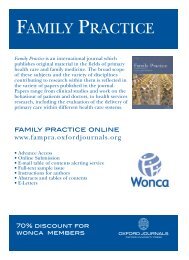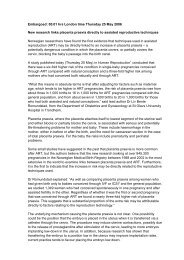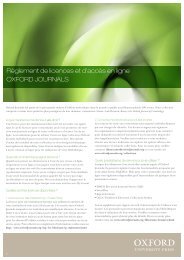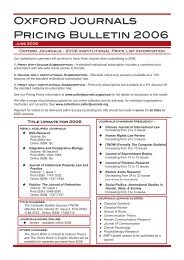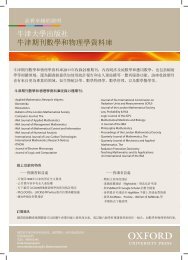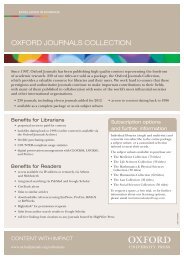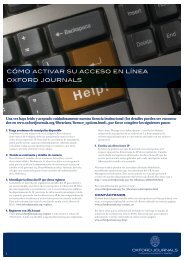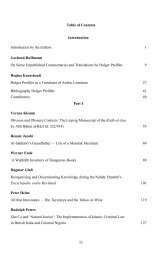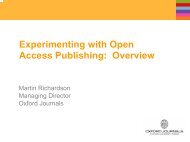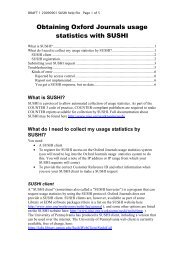Download the ESMO 2012 Abstract Book - Oxford Journals
Download the ESMO 2012 Abstract Book - Oxford Journals
Download the ESMO 2012 Abstract Book - Oxford Journals
Create successful ePaper yourself
Turn your PDF publications into a flip-book with our unique Google optimized e-Paper software.
Annals of Oncology<br />
1131P EFFICACY AND SAFETY OF IPILIMUMAB REINDUCTION<br />
THERAPY PATIENTS WITH PRETREATED ADVANCED<br />
MELANOMA PARTICIPATING IN AN EXPANDED ACCESS<br />
PROGRAMME (EAP) IN ITALY<br />
J. Pigozzo 1 , L. Calabrò 2 , P.A. Ascierto 3 , F. De Galitiis 4 , P.F. Ferrucci 5 ,<br />
P. Queirolo 6 , M.G. Bernengo 7 , M. Aglietta 8 , M. Mandala 9 , M. Del Vecchio 10<br />
1 U.o.oncologia Medica, Istituto Oncologico Veneto IOV-IRCCS, Padova, ITALY,<br />
2 Department of Oncology, Medical Oncology and Immuno<strong>the</strong>rapy,University<br />
Hospital of Siena, Siena, ITALY, 3 Unit of Medical Oncoloty and Innovative<br />
Therapy, Istituto Nazionale Tumori Fondazione G. Pascale, Napoli, ITALY,<br />
4 Department of Oncology, Dermopathic Institute of <strong>the</strong> Immaculate IDI-IRCCS,<br />
Rome, ITALY, 5 Melanoma and Sarcoma, Istituto Europeo di Oncologia, Milano,<br />
ITALY, 6 National Institute for Cancer Research, San Martino Hospital, Genova,<br />
ITALY, 7 Institute of Dermatology, University Hospital St John <strong>the</strong> Baptist, Turin,<br />
ITALY, 8 Div Oncologia ed Ematologia, Fondazione Piemontese per la Ricerca sul<br />
Cancro Onlus, Candiolo, ITALY, 9 Oncology and Haematology, Ospedali Riuniti di<br />
Bergamo, Bergamo, ITALY, 10 Department of Medical Oncology, National Cancer<br />
Institute, Milan, ITALY<br />
Purpose: In <strong>the</strong> registrational phase III trial of ipilimumab, patients who progressed<br />
after initially responding to ipilimumab treatment could subsequently receive<br />
additional ipilimumab <strong>the</strong>rapy with <strong>the</strong> same treatment regimen (reinduction). Here,<br />
we describe efficacy and safety data from <strong>the</strong> Italian subgroup of patients in <strong>the</strong> EAP<br />
who received reinduction with ipilimumab outside of a clinical trial setting.<br />
Methods: Ipilimumab was available upon physician request for patients aged ≥16<br />
years with life-threatening, unresectable stage III/IV melanoma who failed or did not<br />
tolerate previous treatments and for whom no <strong>the</strong>rapeutic option was available.<br />
Induction <strong>the</strong>rapy with ipilimumab was 3 mg/kg every 3 weeks for 4 doses. Patients<br />
who progressed after stable disease (SD) lasting ≥3 months or an initial partial<br />
response (PR) or complete response (CR) were eligible for reinduction <strong>the</strong>rapy at <strong>the</strong><br />
same dose/schedule. Tumour assessments were conducted at baseline and after<br />
completion of induction <strong>the</strong>rapy using immune-related response criteria. Patients<br />
were monitored for adverse events (AEs), including immune-related AEs, within 3 to<br />
4 days of each ipilimumab dose using Common Terminology Criteria for Adverse<br />
Events v.3.0.<br />
Results: Of 848 patients participating in <strong>the</strong> EAP in Italy, 59 received reinduction<br />
treatment. After a median follow-up of 10 months, <strong>the</strong> disease control rate among 26<br />
reinduced patients with data available was 100%; comprising nine patients with a PR<br />
and 17 with SD. Overall, only two reinduced patients died as a result of disease<br />
progression, after 11 and 13 months. As of April <strong>2012</strong>, median overall survival for<br />
patients that received reinduction <strong>the</strong>rapy had not yet been reached. In total, 57%<br />
patients reported grade 1/2 AEs. Grade 3/4 AEs were reported by 15% patients, but<br />
were only considered drug-related in one patient. AEs were generally reversible with<br />
treatment as per protocol-specific guidelines.<br />
Conclusions: Considering available data, reinduction with ipilimumab resulted in<br />
durable objective responses and/or stable disease. No new types of toxicities occurred<br />
during reinduction and most events were mild-to-moderate.<br />
Disclosure: P.A. Ascierto: PA has served as a consultant for Merck Sharp & Dohme,<br />
and as an advisor to Bristol-Myers Squibb (BMS), Merck Sharp & Dohme, Roche,<br />
GlaxoSmithKline, Amgen, Celgene, Medimmune and Novartis. He has received<br />
honoraria from BMS, Merck Sharp & Dohme and Roche. P. Queirolo: Paola Queirolo<br />
has acted as an advisor for Roche, GlaxoSmithKline, Bristol-Myers Squibb and<br />
Schering-Plough and received honoraria from Bristol-Myers Squibb and Roche. M.G.<br />
Bernengo: Maria Grazia Bernengo has acted as an advisor to Bristol-Myers Squibb,<br />
Novartis and Pfizer. All o<strong>the</strong>r authors have declared no conflicts of interest.<br />
1132P EFFICACY AND SAFETY DATA FROM PATIENTS WITH<br />
ADVANCED MELANOMA AND BRAIN METASTASES<br />
PARTICIPATING IN THE EUROPEAN IPILIMUMAB<br />
EXPANDED ACCESS PROGRAMME (EAP) IN ITALY<br />
P. Queirolo 1 , E. Simeone 2 , F. De Galitiis 3 , L. Di Guardo 4 , A.M. Di Giacomo 5 ,<br />
R. Marconcini 6 , V. Ferraresi 7 , F. De Rosa 8 , M. Guida 9 , S. Stragliotto 10<br />
1 National Institute for Cancer Research, San Martino Hospital, Genova, ITALY,<br />
2 Fondazione Pascale, Instituto Nazional per lo Studio, Napoli, ITALY,<br />
3 Department of Oncology, Dermopathic Institute of <strong>the</strong> Immaculate IDI-IRCCS,<br />
Rome, ITALY, 4 Department of Medical Oncology, National Cancer Institute,<br />
Milan, ITALY, 5 Medical Oncology and Immuno<strong>the</strong>rapy, University Hospital of<br />
Siena, Siena, ITALY, 6 Department of Oncology, University Hospital Pisa<br />
“Ga<strong>the</strong>red Hospitals of Santa Clara”, Pisa, ITALY, 7 Department of Medical<br />
Oncology, Regina Elena National Cancer Institute, Rome, ITALY, 8 Medical<br />
Oncology, Scientific Institute of Romagna for <strong>the</strong> Study and Treatment of Cancer<br />
(IRST), Meldola, ITALY, 9 Medical Oncology, National Institute of Cancer, Bari,<br />
ITALY, 10 Medical Oncology II, Istituto Oncologico Veneto IRCCS, Padova, ITALY<br />
Purpose: Patients with melanoma brain metastases have a very poor prognosis and<br />
are usually excluded from melanoma clinical trials. The EAP provided an<br />
opportunity to evaluate <strong>the</strong> feasibility of ipilimumab treatment in this patient<br />
population outside of a controlled clinical trial in Italy.<br />
Methods: Ipilimumab was available upon physician request for patients aged ≥16<br />
years with unresectable stage III /IV melanoma, including those with asymptomatic<br />
brain metastases, who had ei<strong>the</strong>r failed systemic <strong>the</strong>rapy or were intolerant to ≥1<br />
systemic treatment. Induction <strong>the</strong>rapy with ipilimumab was 3 mg/kg every 3 weeks<br />
for 4 doses. Tumour assessments were conducted at baseline and after completion of<br />
induction <strong>the</strong>rapy using immune-related response criteria. Patients were monitored<br />
for adverse events (AEs), including immune-related AEs, within 3 to 4 days of each<br />
ipilimumab dose using Common Terminology Criteria for Adverse Events v.3.0.<br />
Results: Of 848 patients with advanced melanoma participating in <strong>the</strong> EAP in Italy,<br />
144 (17%) had asymptomatic brain metastasis. Of <strong>the</strong>se, data are available for 84<br />
patients. With a median follow-up of 3 months, <strong>the</strong> disease control rate among 74<br />
evaluable patients was 16.2%, comprising four patients with a partial response and<br />
eight with stable disease. As of April <strong>2012</strong>, median progression-free survival and<br />
overall survival among patients with brain metastases were 2.5 months and 3.8<br />
months, respectively. In total, 50.0% patients reported an AE of any grade, most of<br />
which were drug-related (40.5%). Grade 3/4 AEs were reported by 28.5% patients<br />
and considered drug-related in 15.5%. The most common grade 3/4 drug-related<br />
adverse events were diarrhoea (n = 3; 3.6%) and liver dysfunction (n = 3; 3.6%). AEs<br />
were generally reversible with treatment as per protocol-specific guidelines.<br />
Conclusions: Ipilimumab shows activity in patients with advanced melanoma<br />
metastatic to brain, with safety results consistent to what has been previously<br />
reported for ipilimumab.<br />
Disclosure: P. Queirolo: Paola Queirolo has acted as an advisor for Roche,<br />
GlaxoSmithKline, Bristol-Myers Squibb and Schering-Plough and received honoraria<br />
from Bristol-Myers Squibb and Roche. E. Simeone: Ester Simeone has received<br />
honoraria from Bristol-Myers Squibb. All o<strong>the</strong>r authors have declared no conflicts of<br />
interest.<br />
1133P EFFICACY AND SAFETY OF IPILIMUMAB IN PATIENTS WITH<br />
PRETREATED, OCULAR MELANOMA: EXPERIENCE FROM<br />
ITALIAN CLINICS PARTICIPATING IN THE EUROPEAN<br />
EXPANDED ACCESS PROGRAMME (EAP)<br />
M. Maio 1 , V. Chairion Sileni 2 , L. Pilla 3 , S.V.L. Nicoletti 4 , L. Di Guardo 5 ,<br />
P. Queirolo 6 , F. De Galitiis 7 , M. Mandala 8 , M. Guida 9 , P.A. Ascierto 10<br />
1 Istituto Toscano Tumori, University Hospital of Siena, Siena, ITALY, 2 Department<br />
of Oncology, Oncology Institute of Veneto, Padova, ITALY, 3 Department of<br />
Oncology, San Raffaele Hospital, Milan, ITALY, 4 Department of Medical<br />
Oncology, Scientific Institute of Romagna for <strong>the</strong> Study and Treatment of Cancer<br />
(IRST), Meldola, ITALY, 5 Department of Medical Oncology, National Cancer<br />
Institute, Milan, ITALY, 6 National Institute for Cancer Research, San Martino<br />
Hospital, Genoa, ITALY, 7 Oncology, IDI-IRCCS, Rome, ITALY, 8 Oncology and<br />
Haematology, Ospedali Riuniti di Bergamo, Bergamo, ITALY, 9 Medical Oncology,<br />
National Institute of Cancer, Bari, ITALY, 10 Unit of Medical Oncology and<br />
Innovative Therapy, Istituto Nazionale Tumori Fondazione G. Pascale, Napoli,<br />
ITALY<br />
Purpose: Ocular melanoma is a rare malignancy with an incidence of 5.3–10.9 cases<br />
per million per year (Papastefanou and Cohen; J Skin Cancer 2011). Currently, <strong>the</strong><br />
treatment of metastatic ocular melanoma is limited by <strong>the</strong> lack of an effective<br />
systemic <strong>the</strong>rapy. The EAP provided an opportunity to assess <strong>the</strong> activity and safety<br />
of ipilimumab in patients with ocular melanoma outside of a controlled clinical trial<br />
in patients from <strong>the</strong> EAP in Italy.<br />
Methods: Ipilimumab was available upon physician request for patients aged ≥16<br />
years with stage III (unresectable) or stage IV skin, ocular or mucosal melanoma,<br />
who had failed or did not tolerate previous treatments and for whom no <strong>the</strong>rapeutic<br />
option was available. Patients were treated with ipilimumab 3 mg/kg every 3 weeks<br />
for 4 doses. Tumour assessments were conducted at baseline and after completion of<br />
induction <strong>the</strong>rapy using immune-related response criteria. Patients were monitored<br />
for adverse events (AEs), including immune-related AEs, within 3 to 4 days of each<br />
scheduled visit using Common Terminology Criteria for Adverse Events v.3.0.<br />
Results: Of 848 Italian patients participating in <strong>the</strong> EAP, 83 (9.8%) had ocular<br />
melanoma. Of <strong>the</strong>se 83 patients, 55 have data available. With a median follow-up of<br />
3 months, <strong>the</strong> disease control rate among 46 evaluable patients was 34.8%, including<br />
3 patients with a partial response and 13 with stable disease. As of April <strong>2012</strong>,<br />
median progression-free survival and overall survival among patients with ocular<br />
melanoma were 2.9 months and 5.9 months, respectively. In total, 63.6% patients<br />
reported an AE of any grade, most of which were drug-related (47.3%). Grade 3/4<br />
AEs, which were reported by 20.0% patients, were only considered drug-related in<br />
5.4%. AEs were generally manageable and most resolved with treatment as per<br />
protocol-specific guidelines.<br />
Conclusions: Safety and early efficacy results are similar to experience in o<strong>the</strong>r<br />
melanoma populations, thus suggesting that treatment of ocular melanoma with<br />
ipilimumab warrants fur<strong>the</strong>r investigation in prospective clinical trials.<br />
Disclosure: M. Maio: Michele Maio has acted as an advisor for Bristol-Myers Squibb<br />
and Roche. V. Chairion Sileni: Vanna Chiaron Sileni has acted as an advisor for<br />
Bristol-Myers Squibb, Roche, GlaxoSmithKline, Merck Sharp & Dohme and<br />
Schering-Plough. P. Queirolo: Paola Queirolo has acted as an advisor for Roche,<br />
GlaxoSmithKline, Bristol-Myers Squibb and Schering-Plough and received honoraria<br />
from Bristol-Myers Squibb and Roche. P.A. Ascierto: PA has served as a consultant/<br />
Volume 23 | Supplement 9 | September <strong>2012</strong> doi:10.1093/annonc/mds404 | ix369



